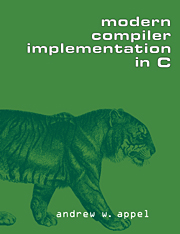Book contents
- Frontmatter
- Contents
- Preface
- Part I Fundamentals of Compilation
- 1 Introduction
- 2 Lexical Analysis
- 3 Parsing
- 4 Abstract Syntax
- 5 Semantic Analysis
- 6 Activation Records
- 7 Translation to Intermediate Code
- 8 Basic Blocks and Traces
- 9 Instruction Selection
- 10 Liveness Analysis
- 11 Register Allocation
- 12 Putting It All Together
- Part II Advanced Topics
- Appendix: Tiger Language Reference Manual
- Bibliography
- Index
4 - Abstract Syntax
Published online by Cambridge University Press: 05 June 2012
- Frontmatter
- Contents
- Preface
- Part I Fundamentals of Compilation
- 1 Introduction
- 2 Lexical Analysis
- 3 Parsing
- 4 Abstract Syntax
- 5 Semantic Analysis
- 6 Activation Records
- 7 Translation to Intermediate Code
- 8 Basic Blocks and Traces
- 9 Instruction Selection
- 10 Liveness Analysis
- 11 Register Allocation
- 12 Putting It All Together
- Part II Advanced Topics
- Appendix: Tiger Language Reference Manual
- Bibliography
- Index
Summary
ab-stract: disassociated from any specific instance
Webster's DictionaryA compiler must do more than recognize whether a sentence belongs to the language of a grammar – it must do something useful with that sentence. The semantic actions of a parser can do useful things with the phrases that are parsed.
In a recursive-descent parser, semantic action code is interspersed with the control flow of the parsing actions. In a parser specified in Yacc, semantic actions are fragments of C program code attached to grammar productions.
SEMANTIC ACTIONS
Each terminal and nonterminal may be associated with its own type of semantic value. For example, in a simple calculator using Grammar 3.35, the type associated with exp and INT might be int; the other tokens would not need to carry a value. The type associated with a token must, of course, match the type that the lexer returns with that token.
For a rule A → B C D, the semantic action must return a value whose type is the one associated with the nonterminal A. But it can build this value from the values associated with the matched terminals and nonterminals B, C, D.
RECURSIVE DESCENT
In a recursive-descent parser, the semantic actions are the values returned by parsing functions, or the side effects of those functions, or both.
Information
- Type
- Chapter
- Information
- Modern Compiler Implementation in C , pp. 88 - 102Publisher: Cambridge University PressPrint publication year: 1997
